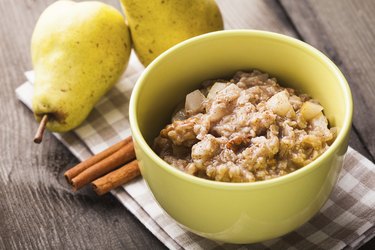
Foods containing soluble fiber, such as oatmeal, are important in your diet to help maintain the health of your digestive tract. This is especially the case if you experience acute or chronic gastritis, a condition characterized by the irritation or inflammation of the stomach wall lining. Before making dietary changes, however, consult your physician for accurate diagnosis and at home care recommendations.
About Gastritis
Video of the Day
The stomach produces acidic digestive juices that help in the process of breaking down the foods you eat into smaller nutrients. A protective coating around the lining of your stomach prevents these acids from causing damage to the stomach walls but in gastritis this protective layer is damaged or weakened. This results in the acidic juices causing stomach wall irritation or inflammation. Different factors contribute to gastritis, including bacterial infections, alcohol use, over-the-counter pain relievers, underlying reflux disease or stress. Gastritis attacks may begin quickly and last for a short period of time or gradually and last for extended periods of time.
Video of the Day
Gastritis Symptoms and Treatment
Upset stomach and pain are common symptoms of gastritis but you may also experience indigestion, heartburn, nausea and dark stool. For most, gastritis does not cause permanent damage to the stomach, but if symptoms persist for a week or more, consult your physician for diagnosis and treatment. Complications of untreated gastritis include ulcers, stomach bleeding or stomach cancer. If your symptoms occur after taking pain medications or drinking alcohol, removal of these irritants can reduce the symptom recurrence and duration. Antibiotic medications to kill bacteria in your digestive tract and acid-blocking medications may also be prescribed by your physician.
Dietary Changes
Alcohol, acidic beverages like coffee, soda or fruit juice with citric acid increase your risk of gastritis symptoms. According to the University of Maryland Medical Center, dietary changes including daily consumption of fiber-rich foods, avoidance of high-fat foods and eating produce with antioxidant compounds called flavonoids to stop bacteria growth may reduce your symptoms. Fiber-rich foods include whole grains, oats, beans and fruits or vegetables. Foods with flavonoids include onions, garlic, apples and celery.
Daily Oatmeal For Gastritis
Oats and oatmeal are non-acidic, nutritious and fiber-rich food options for preventing symptom flares with gastritis. One cup of oatmeal contains 7 grams to 9.8 grams of dietary fiber and it is packed with vitamins and minerals important for a healthy diet. Add fresh fruit to your oatmeal like pear slices, banana or berries, but take caution in using highly acidic fruits that may cause irritation. Opt for plain oatmeal, or you can eat instant oatmeal but read package labels to see if there are added ingredients like citric acid that may worsen your symptoms.